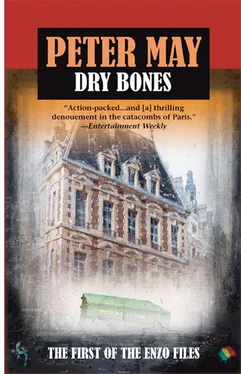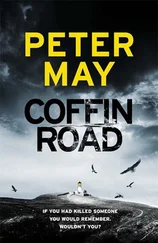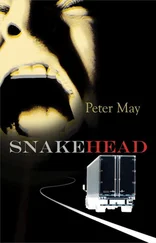‘Roger Raffin.’ Raffin smiled affably and held out his hand.
If Lelong saw it, he chose to ignore it. ‘Ah, yes. The journalist.’ He spat out the word journalist as if it had a bitter taste.
‘That’s right. I’m following Enzo Macleod’s investigation. He’s just uncovered what are certainly more of Jacques Gaillard’s remains. And when the story appears in Libération tomorrow, I think it’s you people who are going to look like the amateurs.’ He pulled a small notebook from his pocket and drew a pen from its spine. ‘Any comment?’
Juge Lelong’s comment was contained within the look he drew the journalist. And if his look had been words, they would have been unprintable.
The Rue des Tanneries, in the thirteenth arrondissement , was in the heart of what had once been the poorest quartier of Paris. The tanneries, which crowded the narrow streets and filled the air with noxious odours, washed their leather in the river Bièvre, polluting the water that powered the mills along its banks. And when Jean Gobelin opened his tapestry factory in the fifteenth century, his new techniques with scarlet dyes turned the river blood red. It was here, in the offices and warehouse of a former coal merchant, that Charlotte had chosen to establish her home and consulting rooms.
‘I’m told,’ she said, ‘that in the old days, on a moonlit midsummer’s night, the streets looked as if they were covered in snow. Everything was layered with a fine, white dust from the treatment of the leather. I guess people must have breathed that stuff in every day. No wonder life expectancy was low.’
Enzo looked from the open kitchen window down into the street below. Most of the buildings were commercial, occupied by offices and wholesale suppliers. The ground-floor windows of Charlotte’s place were barred, the door grilled and padlocked. A heavy, retracting metal door guarded the entrance to the ground-floor storage area of the old warehouse.
Enzo turned to watch her preparing food on the worktop. It was a bright, modern kitchen with a large, blue-painted table at the window. ‘What on earth made you set up base here?’
She smiled. ‘So I wouldn’t bump into any of my clients in the street when I go out shopping.’ She returned to the chopping of vegetables. ‘I’ve made a few changes to the place. Why don’t you take a look around?’
They had come in through a waiting room downstairs, and climbed up a narrow staircase to the first-floor living area. Another three steps led up from the kitchen to a huge, sprawling séjour beyond a sliding Japanese screen door. Venetian blinds diffused the light from windows which ran along the front wall from floor to ceiling. A superstructure of metal cross-supports held up a steeply pitched roof. Brick walls were painted white. A bank of computer screens and monitors flickered on a long table pushed up against the windows. Beyond them, two low settees defined a living space subdivided by shelves lined with files and books.
Raffin sat at one of the computers, searching the internet for background information on Hugues d’Hautvillers. They had driven back to Paris in the early evening, and Raffin had directed Enzo to his parking place in an underground car park in the basement of an apartment building in the Rue St. Jacques, near the Luxembourg Gardens. His own car was in for repair. They had taken the métro, then, to Glacière — one stop from Corvisart, and two from Place d’Italie, names that seemed to be haunting Enzo — and walked to the Rue des Tanneries.
Enzo went down another three steps leading to a metal gallery overlooking the old warehouse storage area. Large interior windows opening into a bedroom immediately opposite made Enzo feel like a voyeur. He could see pale lilac sheets thrown back from a large bed, discarded clothes draped over a chair. He assumed it was Charlotte’s bedroom.
Late evening sunshine streamed in through a pitched glass roof above a second gallery, and when Enzo looked down into the well of the space below, he saw that it had been transformed into an indoor garden, filled with potted plants and gravelled walkways. The constant tumbling of a small fountain filled the whole space with its gentle cadence. Upholstered garden furniture sat around a low, teak table at the centre of the garden. It was an extraordinary oasis in the heart of the city.
‘It’s where I interview my clients.’ Charlotte’s voice startled him, and he turned to find her at his side. She leaned on the rail. ‘Good feng shui . It relaxes them. It relaxes me. It’s almost a therapy in itself.’ She pointed out video cameras mounted on metal struts that criss-crossed the space overhead. ‘I quite often record my sessions so that I can replay them later.’ She nodded towards monitors next to where Raffin was still working at the computer. ‘It means I never have to take notes.’ She paused. ‘Where are you staying tonight? At the studio?’
‘Probably.’
She lowered her voice a little. ‘I have a spare room here.’ And Enzo thought that no matter how much he was attracted to Charlotte, he hated this subterfuge.
‘You’d better come and have a look at this,’ Raffin called over his shoulder, almost as if he had heard her, and they went back up to the séjour . Enzo drew a chair in beside him. ‘Most of the stuff about d’Hautvillers is pretty well buried. Unlike Utopique. But I’m beginning to get a picture of him.’ He rubbed his hands enthusiastically, and started pulling up sites he had already visited. ‘We knew from the old servant at the château that he went to the Pritanée Militaire de la Flèche here in Paris. Apparently this was to prepare him for the competitive exam you have to sit to gain entry to the École Polytechnique.’ He glanced at Enzo, and must have realised that an explanation was required for the dumb foreigner. ‘That’s the grande école that trains the top engineers required for public administration. Seems he came out top of his year at the lycée and won the Concours Général for maths.’
He pulled up another site. ‘Of course, he had no difficulty getting into the Polytechnique. He went on to become one of the top students of his year, and was selected on graduation for the Corps des Mines, which is pretty much the crème de la crème of the engineering cadre .’
He ran his finger down the screen until he found what he was looking for. ‘But he turned that down to follow in the footsteps of a pretty famous predecessor, Valery Giscard d’Estaing. Apparently if you’re smart enough to be offered a place in the Corps des Mines, you’re smart enough to gain direct access to ENA. Which is what he did.’ He turned eyes filled with light towards Enzo and Charlotte.
‘Now, here’s the thing. Each period of study at ENA is called a promotion . Each promotion is given a name by its students, who choose it during a two-week bonding holiday in the Vosges. In d’Hautviller’s case, his promotion was named after Victor Schoelcher, who was a nineteenth century campaigner against slavery and colonial injustice. The Schoelcher Promotion ran from 1994 to 1996—the same period that Gaillard was teaching at ENA.’ He beamed triumphantly. ‘So Hugues d’Hautvillers must have been one of his pupils.’
Enzo drew a long, steady breath. A direct connection between Hugues d’Hautvillers and Gaillard. Did that mean that d’Hautvillers was one of his killers? Enzo was reluctant to make that leap. But it was, at least, a starting point in the search for a motive.
‘Wait a minute.’ Charlotte sat down on the edge of the table and looked at Enzo. ‘The name of Hugues d’Hautvillers came out of the process of decoding the clues you found in Toulouse, didn’t it?’
Читать дальше












